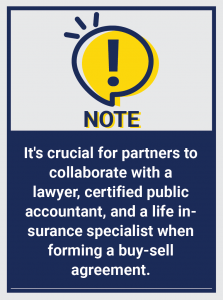702-660-7000
702-660-7000
A buy and sell agreement, also known as a buyout agreement, business will, or business prenup, is a contract that outlines the procedures for reassigning a business partner’s interest should they die or leave the business. Typically, these agreements mandate the departing partner’s share to be bought either by the other partners or by the business itself. Life insurance policies are often used to finance these buyouts.
This kind of agreement is popular among sole proprietorships, partnerships, and closed corporations, aiming to facilitate ownership transition when a partner exits, either by death, retirement, or other reasons.
In essence, the agreement dictates the departing partner’s business interest be sold either to the business itself or to the remaining partners, based on an agreed-upon formula. In situations where a partner dies, their estate is bound to the sale. To fund this kind of transition, each partner often secures a life insurance policy on the other partners. The business can pay for policy premiums , with the partners named as beneficiaries.
If a partner dies, the life insurance policy pays its benefits to the remaining partners. The remaining partners then use this payout to buy the deceased partner’s share of the business from their estate. This system ensures business continuity and preserves its ownership framework. Such agreements help avoid disputes with surviving family members and negate the need for probate court intervention.
There are primarily two types of buy-sell agreements:
Some partners might choose a blend of these two types, letting individual partners buy certain parts and the business entity purchase the rest.
The wait-and-see approach is an example of this which incorporates features from both types. The wait-and-see type agreement does not immediately specify whether the partners or the entity will buy the share. Based on the optimal choice for business stability, the decision is made when required.
For sole proprietors, a chief employee can be nominated as the successor or purchaser.

The primary objective of buy and sell agreements is to assist partners in navigating challenging situations while safeguarding the business and their individual and familial interests.
For instance, the agreement can prohibit owners from offloading their stakes to external investors unless other owners give their approval. This kind of safeguard can be exercised in case of a partner’s death.
A standard agreement may mandate a deceased partner’s stake gets redirected to the business or the surviving partners, stopping the estate from transferring the share to a third party.
Moreover, buy and sell agreements delineate the approaches to evaluate a partner’s share value. Buy and sell agreements can also be instrumental in situations where owner disputes occur over the company’s worth or a partner’s stake. The agreement’s valuation procedures would then come into play.
There are numerous online platforms offering economical or complimentary templates to create a buy-sell agreement. Such templates can be beneficial for startups or smaller entities. However, for expanding businesses or those with multiple initial partners, it’s prudent to have the buy-sell document crafted by a legal expert.
This contract defines the procedures for the remaining partners or owners to obtain a departing partner’s shares in the event of their exit or passing. Engaging a competent attorney is typically the first step.
For ensuring available funds, it’s common for business partners to secure life insurance policies on each other. If a partner passes away, the insurance payout aids in acquiring the deceased’s business stake. Formulating this section of the agreement ideally involves a life insurance agent well-versed in such arrangements.
The following should be outlined in a buy-sell agreement:
A buy and sell agreement facilitates a seamless transition of ownership, ensuring the business remains intact even after a major shareholder or partner exits. This legally binding contract outlines the process by which the remaining partners will acquire the shares of those departing. Not establishing such an agreement can lead to legal disputes. For instance, if a partner passes away without a buy-sell agreement in place, their shares might automatically transfer to their spouse. This spouse might either retain the shares or wish to sell them, potentially putting the other partners in a financial bind if they lack the means to purchase the shares.
Ensuring business stability is crucial, especially when the business is steered by multiple shareholders. A buy and sell agreement offers a legal framework that delineates how to distribute a leaving or deceased partner’s shares among the remaining partners. When a partner dies, life insurance policies typically finance the purchase of the deceased partner’s shares from their estate. Give us a call today and let us help!
 Ben T. McFie
Ben T. McFie
There's a lot of confusion around finance; there's so much to know and it's frustrating when you don't know enough to make the best financial decisions. I like to bring clarity to financial matters so people can make good financial decisions that will help them live wealthier more fulfilling lives.